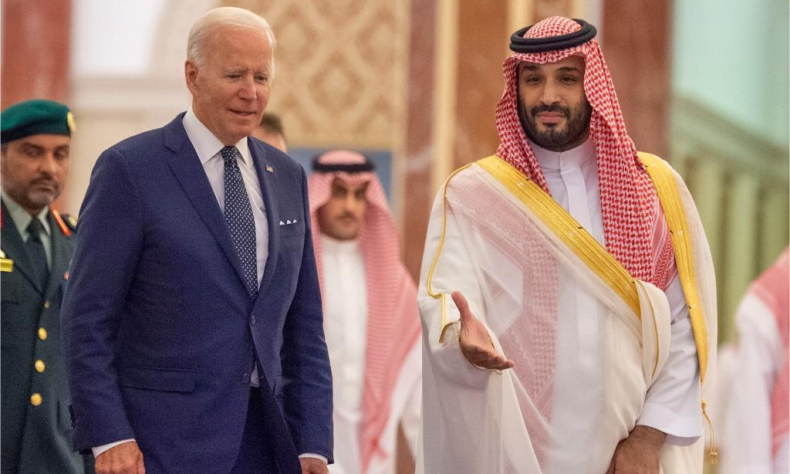Biden’s Middle East Visit: A Lip-Service Show

Without substantial investments, any frameworks and mechanisms will likely turn into skeletons without muscles.
U.S. President Joe Biden’s mid-July visit to the Middle East took place within the context of Russia-Ukraine conflict. Though ambitious, the visit cannot achieve meaningful, sustainable results as the U.S. has neither the necessary capability nor the willingness to get involved substantially in regional affairs.
The last 15 years have seen a gradual retrenchment of the U.S. from the Middle East as a part of its adjustment of global strategy. Former U.S. President Barack Obama initiated the strategy, and was followed by his successor Donald Trump throughout his term and then by Joe Biden in the first part of his.
However, the Russia-Ukraine conflict added new variables to global politics and U.S. Middle East policy as well. As a result of the Middle East gaining new weight in international geopolitics, particularly as a substitute for Russian energy, a policy featuring re-engagement with the Middle East was reasonably initiated and put on the table of the White House’s Oval Office.
It should be expected that the U.S. will boast the successes of the visit, as reported by the media. And it could also boast the successful visit of Biden to Palestine’s West Bank.
However, after the media’s coverage of the visit wanes, the region will return to its regular and original course, with the U.S. being largely absent on major regional issues, including Palestine and the Iran nuclear issue. Biden’s promises and declarations will therefore remain as diplomatic rhetoric rather than actions, and the region will soon again feel disappointed by the U.S.
The Biden administration may now truly realize the new weight of the Middle East, just as rapidly rising oil prices at home stand to further erode the constituency of the Democrats in the coming mid-term elections. Meanwhile, the Middle East continues to narrow the energy supply gap in global markets.

But no evidence indicates that the U.S. has sufficient resources to invest in the region. The U.S. is currently busy with European affairs and the Russia-Ukraine conflict, with the U.S. having to send military assistance to Ukraine incessantly to strengthen their resistance, as well as committed to focusing on the Asia-Pacific region to contain China.
It should be quite easy to deliver promises and statements, but it should not be that easy to deliver substantial resources to deal with problems on all three fronts of Europe, the Middle East, and the Asia-Pacific at the same time. And without substantial investments, any frameworks and mechanisms will likely turn into skeletons without muscles.
Even within the context of the Russia-Ukraine conflict, Biden has insisted that the strategic focus of the U.S. would still be in the Asia-Pacific. Then where does the Middle East fit in this equation? Biden’s mind, to put it another way, is still affixed to Asia-Pacific issues, not anywhere else. The visit might be a necessity, but his input may not necessarily be on his mind.
Therefore, Middle Eastern countries, if reasonable enough, would stay on their own course of constructing a regional order, while abandoning the illusion that the U.S. is returning.
Over the past couple of years, partly due to their disillusionment about America’s presence, regional actors have interacted with each other robustly. This détente took place almost between all major conflicts in the region except between Iran and Israel. Iran and Saudi Arabia even conducted five rounds of negotiations in Iraq last year for the purpose of normalizing relations. The détente is expected to result in peaceful relations among regional actors, though it may not necessarily end in a well-shaped regional order.
As a region that has incubated civilizations, the elites and decision-makers in the region will certainly have the wisdom to continue their efforts to construct a regional security framework and, finally, a regional order of their own. Either way, the people of the region should decide their place in regional affairs rather than looking to irresponsible external actors.
Jin Liangxiang is Senior Research Fellow with the Center for West Asian and African Studies, Shanghai Institutes for International Studies.
 Facebook
Facebook
 Twitter
Twitter
 Linkedin
Linkedin
 Google +
Google +










